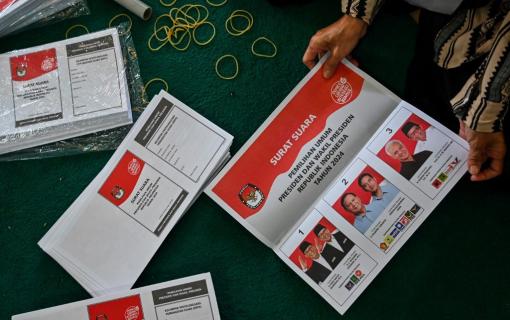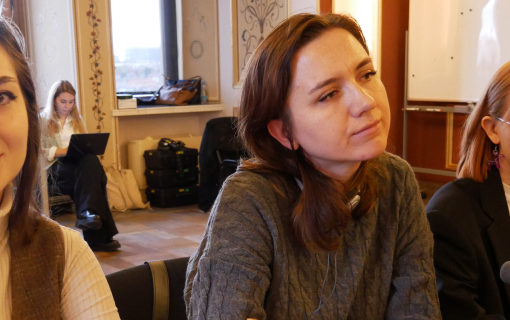IFES President Visits Medan, Indonesia, to Support Women’s Leadership Program
Following Indonesia’s July 9 presidential election, IFES President and CEO Bill Sweeney travelled to Medan in North Sumatra to meet with some of the participants of IFES’ women’s leadership program. The program, implemented in partnership with the Center for Political Studies, Department of Political Science (Puskapol) at the University of Indonesia, aims to address the lack of representation in the field of electoral administration in Indonesia and prepare women to serve in different positions in electoral administration.
Before meeting with participants from the training program, Sweeney met with North Sumatra Provincial General Elections Commission (KPUD) Commissioners Benget Silitonga and Evi Ginting, the only female General Elections Commission (KPU) Commissioner at the provincial level. Sweeney was pleased to see women represented at this senior level and hoped to see Commissioner Ginting working at that national level when he next visited Indonesia. The Commissioners updated Sweeney on the presidential election in North Sumatra. During the meeting he also heard about the KPU’s involvement in the women’s leadership program. Commissioner Silitonga was extremely supportive of the program, attending the training to take part in a question and answer session to explain the role of the KPU at the provincial level. Following the training, Timo Dahlia, a participant in the training was promoted to regency KPU Commissioner. Silitonga confirmed that her participation in the training was a contributory factor to her success.
[caption caption="Sweeney, together with Vasu Mohan, Acting Regional Director for Asia and Europe, meets with Commissioners Ginting and Silitonga (far right)."] [/caption]
[/caption]Sweeney then met with Syafrida Rahasan, North Sumatra Chairperson of Bawaslu (the Election Oversight Body) and participant in the women’s leadership training program.
“It is really crucial that women are encouraged to take part in elections and that more women are recruited into senior roles. The culture here tends to be male dominated. Women need to free their minds from the idea that they are housewives. To do this they need to build their confidence and understand more about elections. This training program helped to do both these things. For me, the sessions on negotiation and confidence building were particularly useful. I frequently have to meet with senior officials such as the Governor and military leaders and in meetings where I am often the only female in the room," said Syafrida, a passionate champion of women’s involvement in the electoral process.
Following the training, Syafrida made sure that she shared the additional knowledge and material that she gained in both technical meetings within Bawaslu and in a training for her staff.
[caption caption="Sweeney and Syafrida share ideas about women’s involvement in elections"] [/caption]
[/caption]In the evening, at a dinner hosted by Sweeney for some of the training facilitators and participants, he had a chance to hear more about their experiences, the challenges they face and what needs to be changed.
[caption caption="Sweeney hosts a dinner for the participants of the IFES supported women’s electoral leadership training in Medan"] [/caption]
[/caption]
“Previously, I worked as member of the provincial supervisory body selection committee. One of the key challenges women face is that they do not perform as well as men in the written test. This is because they are often less well educated and have less experience. One of my key roles as a member of the selection committee was to advocate for women’s representation. Although there is a legal requirement for 30 percent representation of women at all levels, the law is not enforced,” said Maya Manurung, a lawyer, women’s activist and facilitator for the program.
The need for the law to be enforced was a strong message Sweeney heard from other participants. Nelly Armayanti, former Chairwoman of Medan Municipal KPU in 2004, a lecturer with ambitions to be Mayor of Medan, was very impressed with the training. She emphasized the importance of the program in motivating women to participate in elections and to develop their leadership potential. She highlighted the difficulties women have in being recruited to senior roles. She recommended that an important step in addition to building the capacity of women to participate in elections was for a concerted lobbying effort to push for the enforcement of the 30 percent legal requirement and for selection teams to become more gender sensitive.
[caption caption="Nelly Armayanti explains the challenges relating to women’s representation at a senior level in the electoral process"] [/caption]
[/caption]
At the end of the dinner, Natalia Sirait, one of the quieter guests at the dinner spoke up. She explained that she had never been involved in elections before. She found the training extremely helpful in building her self confidence and was encouraged by the more experienced participants in the training. Following the training, she heard about the vacancies to work as poll observer for Bawaslu from the Blackberry messaging group set up by the participants at the Medan training. She applied and got the job.
As the dinner came to a close, Sweeney thanked the participants for their time and invaluable contributions, which he said would help inform IFES’ future work to increase women’s representation in Indonesia and other countries. He noted that their stories illustrate the need for and impact of this type of training and encouraged them to believe in themselves and continue to advocate for change.
Katie Ryan is former Deputy Country Director for Nepal and is currently working as a Senior Training and Gender Adviser for IFES. She has worked on women's leadership programs in a number of countries including Cambodia and Indonesia.









